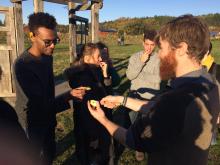Chimacum, Olympic Peninsula, WA, USA
What is the relationship between social and environmental justice, in the U.S. and globally? In this study away program, we will examine modalities of healing between the land and ourselves, exploring paths forward towards social and environmental justice. Weaving together three strands of thought and practice, we will: 1) face head on questions of food justice and food sovereignty in the context of settler-colonialism; 2) gain hands-on experience, working with land in both urban and rural environments; 3) explore creative responses to the problems at the intersection of social justice and the climate crisis. We will live on a property on the Olympic Peninsula that will serve as refuge from the city while we consider the imperatives of reparations, and ways to bring refuge and reparations together as mutually necessary to repair the wounds that plague our current ways of living.
Engaging with nature through foraging, gardening, and learning agro-ecology practices, we will also explore how the synergy between hands-on activities and more traditional humanities can nourish humans and our communities, helping to repair and replenish our hearts in these conflicted times. We will experience how thoughtful, caring work on and with the land can provide refuge, space for reflection on racial identity, and suggest practical steps to repair relations between humans and nature. Considering examples of indigenous cultural resilience and resistance in the countries of Georgia, Cuba, and Kenya, we will put our local colonial history into an international context.
We will split our time between Seattle and Chimacum, Washington. During the weeks (Monday-Thursday), we will visit and work in community gardens in Seattle where people are committed to practicing food sovereignty and careful stewardship of the land: Nyema Clark’s Nurturing Roots; The Common Acre; and Seattle’s original P-Patch, at Picardo. We will hold seminar discussions in the gardens, and experience hands-on applications of the class readings. We will spend three-day weekends (Friday through Sunday) in Chimacum, WA, furthering our work in agro-ecology, tending a chemical-free garden, and foraging among both native and so-called “invasive” plants. We will visit local Black and woman-owned farms on the Olympic Peninsula. Students will have time for reflection and creative activities in an on-site studio space.
Note: the program fee includes all meals during the three-day weekends in Chimacum.
- CHID 390: Radical Refuge: Nurturing Humanities in the Climate Crisis (5 credits I&S)
- CHID 480: Beyond Permaculture: Desettling the Agrarian Arts and Sciences (5 credits I&S)
- CHID 499: Independent Study (2 credits)
*Note that the fees stated above do not include some additional costs, including, but not limited to: Study Abroad Insurance ($1.74/day) and personal spending money. These costs will differ by program. Be sure to read our Fees, Financing, and Withdrawal information for details about the fee structure and payment schedule.
